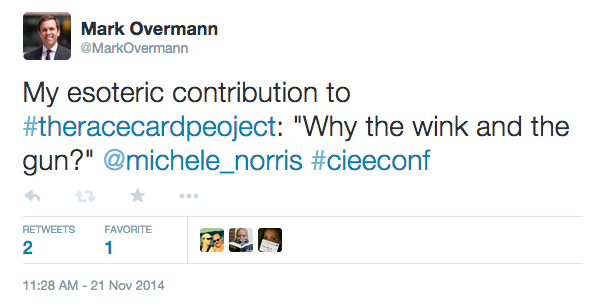Attending CIEE’s annual conference last week in Baltimore, I had the opportunity to hear Michele Norris of NPR speak. Norris talked about how she “had it all planned out” but ultimately had to set those plans aside, when life pushed her in a different direction (a sentiment I’m sure many of us can relate to). Specifically, Norris meant she thought she never wanted to be “the reporter who was always talking about race,” but ultimately came to embrace her passion for encouraging candid conversations among Americans about race, ethnicity, and cultural identity.
To that end, she began the Race Card Project, an effort to encourage these conversations. She asks people to distill their thoughts, feelings, and observations about race into one six word sentence. She challenged the CIEE audience to try. Mine came out like this:
Norris tweeted me back, asking to hear more. So here it is:
I grew up in a mostly white suburb north of Cincinnati, Ohio. My grade school was not diverse. I remember one black classmate in my year – we played baseball and basketball together – and one girl of Asian descent, but that’s about it. My high school was more diverse, but not by much.
When I was 15 and a half, going on 16, I enrolled in a driver’s ed course, as everyone at that age does. The driving school was in a diverse neighborhood that was also central to many other neighborhoods – so the school drew students from a variety of different places and backgrounds. Which meant a variety of races. Which meant I was in class for the first time with a lot of black students.
I didn’t think much about this in the broader sense of racial politics or diversity. But I do remember being aware of it, aware of the details, like the way my black classmates talked to one other, interacted with the teacher, and approached the learning environment – which was often different than what I was used to at my mostly white school. Not wildly or uncomfortably different, but different enough that I can, 18 years later, still remember being in that classroom.
One day in class, the teacher asked a question. I couldn’t tell you what that question was, but I guess I knew the answer, so I volunteered. I was correct, and the teacher said well done. I remember one of my black classmates turning around and praising me for my correct answer. I don’t remember exactly what he said, and I don’t remember his particular tone or intention. Meaning, he might have been actually praising me, or maybe he was gently giving me shit for being a know-it-all, or more likely somewhere in between. Just one teenager talking to another.
And anyway, that’s not really important. What’s important – and what I do clearly remember – is my reaction. I gave him the wink and the gun. You know, the wink and the gun: that gesture where you stick out both hands like mock guns, thumbs raised and pointer fingers pointed ahead, while winking and making a little clicking sound with your tongue and your back teeth. The reaction to this was instantaneous: raucous laughter all around. Someone yelled with glee, “Oh, he gave you the wink and the gun!” The teacher called for order, things quieted down, and class continued.
I was left burning with some combination of embarrassment and confusion. Why the wink and the gun? Why did I just decide on a gesture I’d ever done before and probably haven’t done since (at least non-ironically)? Did I think this was something black kids my age did? Did I think it would make me “cool” with him? Did I just not have any idea how to relate to a black peer, so I crashed around searching for something, anything, I thought to be appropriate?
In the grand scheme, a small moment. But one that has, for whatever reason, stuck with me. I’m not even sure there’s a broader point here. But if there is, maybe it’s this: when we’re getting to know people different than ourselves (different race, gender, neighborhood, country, culture, etc.), it’s probably best to just be ourselves. And maybe even more importantly, best to allow those we’re getting to know to be themselves too—and avoid imposing upon them our own (likely erroneous) notions of who they are.
Oh, and also, don’t give the wink and the gun. To anyone. It makes you look like an idiot.



